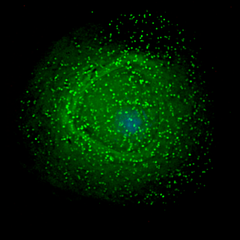Immune cells proposed as HIV hideout don't last in primate model

HIV emerging from an infected macrophage. (PLoS Biology, 2006)
-
Macrophages have been proposed as long-term reservoirs for HIV. Yerkes researchers have been figuring out how long infected cells of this type actually last in SIV-infected monkeys.
Woodruff Health Sciences Center | Oct. 31, 2014
Where does HIV hide? Antiretroviral drugs can usually control the virus, but can't completely eliminate it. So any strategy
to eradicate HIV from the body has to take into account not only the main group of immune cells the virus targets, called
CD4 or helper T cells, but other infected cells as well.
New research from Yerkes National Primate Research Center, Emory University, sheds light on the question of which cells
support viral replication and persistence, and the answers have implications for future efforts to eliminate HIV from
the body in human patients.
The results were published Oct. 30 in the journal PLOS Pathogens .
"Our results have implications for efforts to cure HIV," says lead author Mirko Paiardini, PhD, assistant professor
of pathology and laboratory medicine at Emory University School of Medicine and Yerkes National Primate Research
Center. "Our findings suggest that therapeutic strategies aimed at stimulating infected macrophages may
facilitate viral elimination."
Researchers at Yerkes looked at what happens when rhesus macaques have CD4 T cells removed from their immune systems
before infection by HIV's cousin SIV. They found that another type of immune cell, called macrophages, then becomes
heavily infected by SIV. Infected cells are present in lymph nodes, intestine and brain as well as in the blood.
However, the macrophages live shorter than expected based on previous research studies, which calls into question
the idea that the macrophages could serve as a long-term hideout when someone is infected by HIV but receiving
antiretroviral drugs.
"Among HIV researchers, there has been a lot of debate about the contribution of macrophages to the HIV reservoir,"
Paiardini says. "We show that in the absence of CD4 T cells, macrophages can be heavily infected by SIV, which
supports a role for macrophages in viral infection. However, when infected at high levels, macrophages
become short-lived cells in vivo, with an average lifespan of 1.3 days. Thus, if validated in the
setting of HIV infection in humans, our data support a model in which macrophages do not
constitute the long-lived reservoir (in order of weeks) that has been proposed."
The researchers also found evidence that in macaques with depleted CD4 T cells, SIV is infecting microglial cells
in the brain, otherwise rarely seen.
Co-first authors were postdoctoral fellow Luca Micci, PhD and Robin Iriele from Yerkes and Xavier Alvarez from
Tulane. Yerkes co-authors included Guido Silvestri, MD, and Cynthia Derdeyn, PhD, and collaborators from Tulane
University, the National Cancer Institute and the University of New South Wales contributed to the paper.
The research was supported by the National Institute of Allergy and Infectious Diseases (R56AI087186, R01AI084836,
P30AI50409) and the NIH Director's Office of Research Infrastructure Programs (Primate Centers: P51OD11132 -
formerly NCRR P51RR000165).
###
The Robert W. Woodruff Health Sciences Center of Emory University is an academic health science and service center focused on missions of teaching, research, health care and public service.
Contact
Lisa Newbern
404-727-7709
lisa.newbern@emory.edu
Source:
EMORY UNIVERSITY | Woodruff Health Sciences Center
For more HIV and AIDS News visit...
Positively Positive - Living with HIV/AIDS:
HIV/AIDS News
|